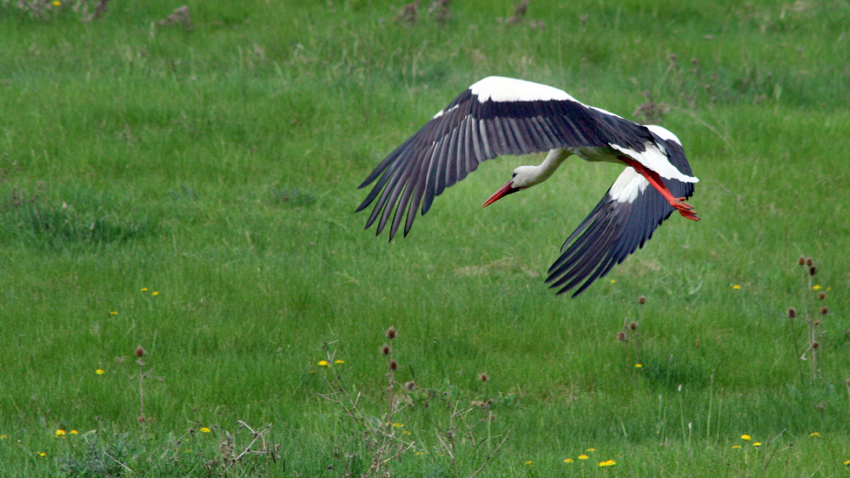The stork is probably the most popular, or at least the most beloved big bird in Europe. These beautiful white birds are characters in many stories and legends and are symbols of springtime. The silhouette of the bird strolling in the fields can be seen in quite a number of paintings. But the industrial revolution made the number of storks decrease sharply on the old continent especially so sometime later - during the 20th century. This alarming fact made environmentalists worry and in 1934 the first global census of the white stork was held. Since then it repeats every 10 years. The census is organized by BirdLife International - a network of over 110 environmental organizations from all over the world. Bulgaria was included in this global monitoring in the 70s of the past century. From June 15 to July 10 this year a new census is conducted in this country by the Bulgarian Society for Protection of Birds /BSPB/. The counting will continue during the same period next year. A decline or rise in the population of the white stork is an important indicator of the quality of the environment which we all live in.
The largest global monitoring of the stork is underway. Luckily, the implementation is relatively easy, as the white stork is easily recognizable. Even children can participate and they do it with joy, counting the birds’ nests. The monitoring will also identify the threats to the storks. During the years threats have proven to be industrialization, monoculture and the extensive use of chemicals in agriculture, as well as the loss of wetlands, where storks most often look for food.

What were the results of the previous stork census in the country?
In 2004, storks in Bulgaria were nearly 5,000 pairs and hatchlings were 12 500 says Svilen Cheshmedjiev, campaign coordinator in the country.
"This is an average level for a European country,” he added. “Bulgaria places 10 -11th in Europe when it comes to the population of these birds. Most storks nest in Poland, where 46,000 pairs were counted. In Bulgaria the greatest number of storks can be seen in the regions of Plovdiv, Haskovo, Sofia and Pleven. In the region of Plovdiv we counted 486 pairs of white storks last time. The village with most nests was Dragushinovo near Samokov with 36 pairs of nesting storks. The town of Kozloduy follows with 27 pairs and the town of Saedinenie comes third with 26 pairs.”
Storks increasingly nest on electric poles, rather than trees.
Abrupt changes were observed between the censuses in 1994 and 2004 and the cause is known - the lack of large trees suitable for nesting. More from Svetoslav Spassov of BSPB:
"Most nests (about 3900) were on electric poles; there were about 950 on buildings, roofs, chimneys, schools. There were only 680 nests on trees, as storks prefer mulberry trees and oaks. "
Apparently the love between humans and storks is mutual, because most of these birds prefer nesting near humans. Just 10 percent of them nest in completely depopulated areas in Bulgaria.

What results are expected from the ongoing census?
It is difficult to predict the trend, expert Svetoslav Spassov says.
"In the period 1994 - 2004 we registered 18% increase in the population of the white stork. We assumed that was due to the collapse of intensive farming from the times of communism. Collective farms counted on monoculture and serious use of pesticides. This naturally ended in the 90s with the collapse of socialist agriculture planning. Biodiversity increased as well as the sources of food for the storks. But now European subsidies are provided for agriculture and grasslands disappear. It will be interesting to see how this has affected the population of the white stork.”
What does the periodic monitoring of other field birds show?
"In the period 1995 - 1997 the number of field birds increased but the trend reversed after 2010. We cannot say yet what the situation with the white stork is. The bird is associated with a particular habitat - wetlands and it is possible things are different there.”
English: Alexander Markov
Measurement equipment installed at the Bulgarian Antarctic base "St. Kliment Ohridski" has been collecting valuable data on solar activity and its relation to the Earth's magnetic field for two months. The research is part of Bulgaria's first polar..
558 Bulgarians aged 18, selected from 1,785 applicants, will be able to embark on their dream journey by train across Europe, learn from other cultures and build new friendships. They have been selected to receive a free travel pass through the..
In the era of increased digitalization and the penetration of artificial intelligence into all spheres of our lives, the professions of people with high qualifications and higher pay are most at risk of extinction. The least affected are jobs that..
21 February is International Mother Language Day, first proclaimed as such by UNESCO and later adopted by the UN General Assembly. The right to..
Prayer served by His Holiness Bulgarian Patriarch Daniil on February 22, marks the beginning of the celebrations for the consecration of..
In the era of increased digitalization and the penetration of artificial intelligence into all spheres of our lives, the professions of people with high..

+359 2 9336 661
